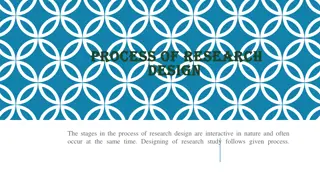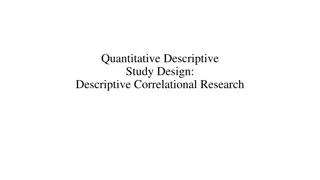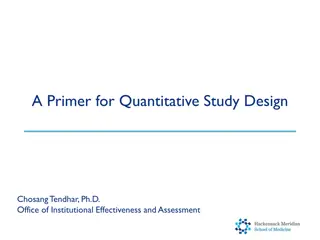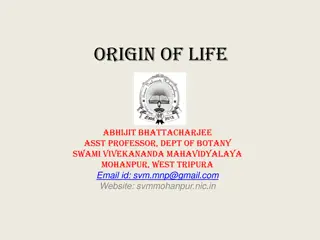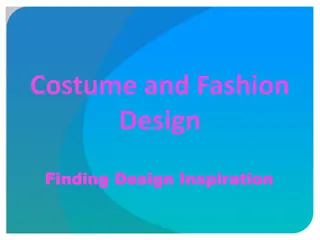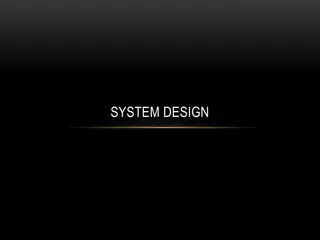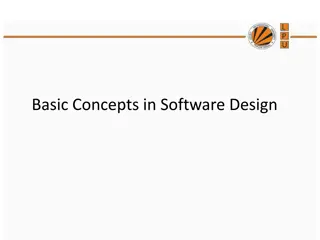Understanding Research Design in Botany: An Overview
Explore the fundamentals of research design in botany through topics like introduction, parts, features, and importance. Learn about the meaning of research, problem formulation, data collection, and different types of research approaches such as descriptive, applied, quantitative, and qualitative. Gain insights into empirical, fundamental, and analytical research methods. Get a clear understanding of the significance and purpose of research design in collecting and analyzing data effectively.
Download Presentation

Please find below an Image/Link to download the presentation.
The content on the website is provided AS IS for your information and personal use only. It may not be sold, licensed, or shared on other websites without obtaining consent from the author. Download presentation by click this link. If you encounter any issues during the download, it is possible that the publisher has removed the file from their server.
E N D
Presentation Transcript
By Dr. Zaryab Khalid Class: BS Botany Semester: 7th Subject: Research Methodology
INTRODUCTION RESEARCH DESIGN PARTS OF RESEARCH DESIGN FEATURES OF A GOOD RESEARCH DESIGN IMPORTANT CONCEPTS OF RESEARCH DESIGN NEED & IMPORTANCE
Meaning of Research It Is A Careful Investigation Or Inquiry Specially Through Search For New Facts In Any Branch Of Knowledge Is Research . Called As
Defining and redefining the problems. Formulating the hypotheses or suggested solutions. Collecting, organizing and evaluating data. Making deductions and reading conclusions. fit the formulating hypotheses.
Descriptive affairs as it exists at present. Researcher only reports only what has happened or what is happening. Descriptive Research: Research:- -Means description of Means description of the state the state of of Applied Research: immediate problem facing a society or an industry/ business organizations . Applied Research:- - Aims Aims at finding at finding solution for solution for an an Quantitative quantity or amount. Applicable to phenomena that can be expressed in terms of quantity. Quantitative Research: Research:- -Based Based on on the measurement the measurement of of Conceptual Research: theory. Used by philosophers and thinkers to develop new concepts or re-interpret existing ones. Conceptual Research: - - Related Related to to some some abstract ideas abstract ideas or or
Empirical Research: observations alone, often without due regard for system and theory. Empirical Research: - - Relies Relies on on experience experience or or Qualitative Research: phenomenon, i.e. phenomenon relating to or involving quality or kind. Qualitative Research: - - Concerned Concerned with with qualitative Fundamental Research: generalizations and with the formulation of a theory. Fundamental Research: - - Mainly concerned with Mainly concerned with Analytical on information already available and analyze these to make a critical evaluation of the material. Analytical Research Research: : - - Researcher Researcher has has to to use use facts facts
MEANING OF RESEARCH DESIGN A research design is the arrangement of conditions for collection and analysis of data in a manner that aims to combine relevance to the research purpose with economy in procedure.
Sampling design Observational design Statistical design Operational design
Sampling design - Which deals with the methods of selecting items to be observed for the study. Observational Observational design design - - Which relates to the condition under which the observation are to be create.
Statistical design - Which concern the question of the of How information analyzed How the be the information and analyzed ? ? and data data gathered are to gathered are to be Operational Operational design design - - Which deals with techniques by which the procedures satisfied in sampling
A research design appropriate for a particular research problem, usually involves the following features. The mean of obtaining information. The availability and skills of the researcher and his staff, if any. The objective of the problem to be studied. The nature of the problem to be studied . The availability of time and money for the research work.
Dependent Dependent and and independent independent variables: variables: A concept which can take on different quantitative values is called a variable. A phenomena which can take on different qualitatively values even in decimal value are called continues.
Extraneous variables Extraneous variables - - That are not related to the purpose of the study but may effect on the dependent variables are termed as the extraneous variables. Control One important characteristic of a good research is to minimize the influence or effect. The terminal term used when we design the study minimizing the effect of extraneous independent variable Control - -
Conformed Conformed relationship relationship When the dependent variable is not free from the influence of extraneous variable . the relationship between the depended and independent variable is said to be confused by an extraneous variable. Research hypothesis Research hypothesis - - The researcher hypothesis is a predicative statement that relates an independent variable to dependent variable.
Experimental and non experimental testing Experimental and non experimental hypothesis testing - - hypothesis When the purpose of research is to test a research hypothesis, it us termed as hypothesis testing research . It can be experimental or non experimental. Experimental and Experimental and control control groups groups - - When a group is exposed to usual conditions, it is termed as a control group. But when the group is exposed to be some special condition, it is termed as Experimental group .
Treatments Treatments The different conditions under which Experiment and control groups are put up usually referred to as treatment. Experiment Experiment - - The process of examining the truth of a statistical hypothesis, relating to some research problem, is known as an Experiment. E.g.:- we can conduct an Experiment to examine the usefulness of a certainnewly developed drug.
NEED & IMPORTANCE - Smooth sailing of research operations. Stands for advance planning of the methods. Great bearing on reliability of the results. Helps to give directions. Helps in decision making. Research design prevent blind searching. Helps researchers to anticipate potential problems in collecting data etc.
RESEARCH METHODOLOGY Methods and Techniques , 3rd edition, by C R Kothari and Gaurav Garg pg no 1 to 51. Robson, C. (1993). Real-world research: A resource for social scientists and practitioner researchers. Malden: Blackwell Publishing







